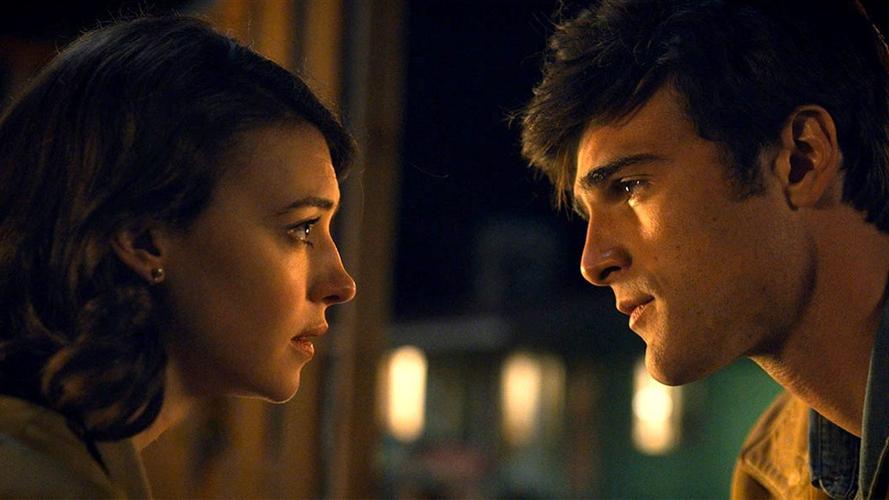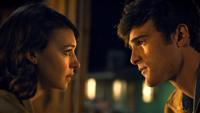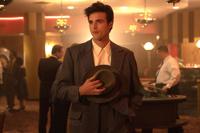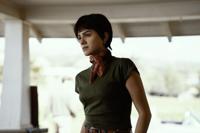This year marks the 20th anniversary of Brokeback Mountain (2005), a landmark in Hollywood in terms of LGBTQ representation. Based on a 2019 novel by Shannon Pufahl, this film, adapted by Bryce Kass and directed by Daniel Minahan (Fellow Travelers and American Crime Story), is essentially a revisit of the same themes of Brokeback Mountain, which was about a married man in the late 1950's, early 60's who has an affair with a same-sex partner in rural America. In this narrative, instead of a married man, it's a married woman. Instead of her being gay or lesbian, she seems to be bisexual. Also, instead of focusing on just her, the film centers on another queer person and shows us other experiences occurring in that same time period. The 2005 Oscar-winner was very insulated, making us feel the isolation that can come with queerness. This film attempts to address that aspect but also show more community even in the 50's. For example, I don't think we see the characters in Brokeback Mountain go to a gay bar. In this film, we do see them go to a gay bar.
Daisy Edgar-Jones (Twisters and Where the Crawdads Sing) stars as Muriel Walker, a young woman living in Kansas in 1956. She inherited a house from her mother who passed away. Her mom was one of the first women to get a divorce in that state. Muriel's mom was an independent woman who didn't live the traditional life and Muriel inherited a lot of that independent and non-traditional spirit. For example, she doesn't seem to be too eager when her boyfriend proposes marriage. He wants that traditional life. She doesn't. Yet, the film never explains why she accepts his proposal when it's clear, it's not what she wants. She seemingly loves the man whom she marries, but, even at the time of the proposal, it's clear that she's in love with someone else who might be a better partner for her. The same could be said about the protagonist in Brokeback Mountain, but that character wasn't presented with the options that Muriel is.

Jacob Elordi (Euphoria and The Kissing Booth) co-stars as Julius Walker, the brother to Muriel's husband. He's a veteran of the Korean War. He was discharged from the Navy, but he never explains why. He visits his brother in Kansas who is living apparently with Muriel. He visits them for the Christmas holiday. It seems like he hasn't met Muriel before, but he behaves so familiar with her. He even acts as if he's trying to seduce his brother's fiancée. He never does anything too overt, but the vibe is that he has feelings for her that are unspoken and that she has feelings for him that are also unspoken. He probably connects with her because he doesn't want a traditional life either.
Emmy-nominee Will Poulter (The Bear and Dopesick) also co-stars as Lee Walker, the husband to Muriel and older brother to Julius. He's the one who wants the traditional life. He has the dream of marrying Muriel and moving to San Diego, California. He wants to get a regular job, buy a house and have kids, the typical, simple existence. He wants his brother to live with them, mainly because he knows his brother is queer, and he wants to watch over his brother. He never says the word queer or gay, but Lee knows that his brother swings both ways or at least in a different way. Strangely though, he spends the majority of the film oblivious to the fact that Muriel swings both ways too.

However, as the film opens, there's not much hint of queerness. At first, it feels as though Muriel, Julius and Lee might engage in a threesome or have a polyamorous kind of relationship. Then, it feels as if the story is going to be about Muriel and Julius having an affair with each other behind Lee's back. What's ultimately revealed is that whatever attraction Muriel and Julius have for one another is simply them recognizing that they're both queer and want non-traditional lives. They initially bond over their love of gambling. Both like making bets for money. Julius loves poker, whereas Muriel latches onto horse racing. Their gambling interests lead them to realizing their queerness, or specifically it leads them to meeting their same-sex love interests.
The film introduces us to their same-sex love interests and what's crazy is that their potential partners are vastly more interesting than Muriel and Julius are in and of themselves. Yet, the film dismisses them. Sasha Calle (The Flash and The Young and the Restless) plays Sandra, the next door neighbor to Muriel when she and Lee move to San Diego. Sandra is a musician who is trying to save her family home of 60 years to eminent domain. The film ends and there is no resolution to Sandra's issue. We never learn if she saved her family home or not. Unfortunately, I was vastly more interested in Sandra saving her house than I was with Muriel's gambling at the horse track, so the film dropping it felt unsatisfying.

Diego Calva (Babylon and Narcos: Mexico) plays Henry, a fellow worker at a Las Vegas casino where Julius also works. Henry is Latino, possibly an immigrant from Mexico who is reminiscent of a young Javier Bardem. Henry believes that the only way to get ahead at all is by cheating and stealing. He plans to commit card tricks in order to win at poker and blackjack at various casinos. Henry shows that as a queer person of color, cheating and stealing are probably his only means of surviving, which Julius recognizes to some degree, so learning more about him became more interesting than even learning more about Julius. Yet, the film eventually dismisses him. There's sexual heat between him and Julius, but not much else. If we're meant to buy Henry and Julius as this great love story, more was needed.
Rated R for sexual content, nudity and some language.
Running Time: 1 hr. and 57 mins.
In theaters.












